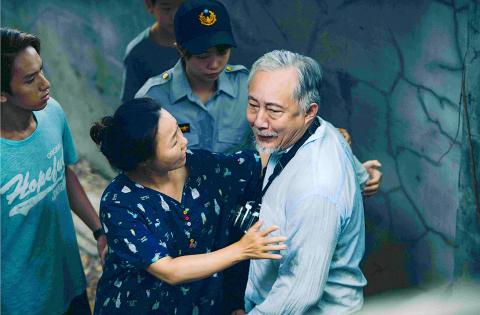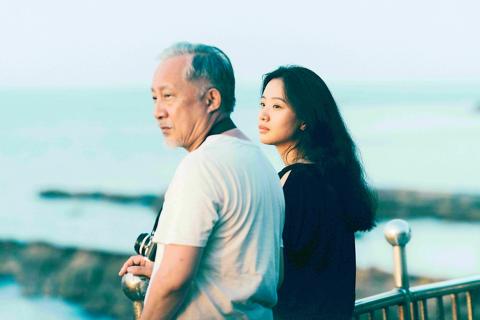It seems like director Chang Tso-chi (張作驥) has a lot he wants to say in Synapses (那個我最親愛的陌生人), which opened for this year’s Golden Horse Film Festival. A lot has happened to him in the past few years — he was convicted of sexual assault and sent to prison in 2015 while his feature Thanatos, Drunk (醉生夢死) won big at that year’s Taipei Film Awards; soon after his release in 2017 his mother developed acute dementia and he cared for her until her death.
Synapses, which earned Chang a nomination for Best Director at Saturday’s Golden Horse Awards, is dark and muddled, and although the underlying theme is clearly dementia and the loss of memories, the plot meanders rather aimlessly. It seems like a lot is going on, but none of it exactly fits together, and there’s not much of a driving narrative as it feels like the film could have ended any time in the second half.
Perhaps this incoherence reflects the existence of Chun-hsiung (Zhang Xiao-xiong, 張曉雄), an elderly veteran suffering from dementia, living with his family in a dilapidated old house in Keelung. He is the film’s weightiest presence, but he’s also not really there due to his deteriorating mind. There is no cure for his condition, and there’s no way to sugarcoat such a story, which adds to the hopelessness of the tone. But the resulting product is rather hard to watch, feeling much longer than its 116-minute running time.

Photo courtesy of atmovies.com
The film is seen mostly through the eyes of Chun-hsiung’s 9-year-old grandson Chuan (Lee Ying-chuan, 李英銓), who tries to make sense of the events that unfold while trying to hatch a turkey egg for his school assignment. He plays the role of the observer that keeps a certain distance from the other characters, but he’s also just as involved because many of the conflicts arise because of him.
Most of the acting is superb, with a masterful performance by Lu Hsueh-feng (呂雪鳳), who plays Feng, Hsiung’s seemingly loving wife of 30 years who devotedly takes care of him. But when Chuan’s mother Xiao Meng (Li Meng, 李夢) comes home after spending six years in jail, things start to unravel and the secrets of this seemingly normal family are revealed.
There’s also Chuan’s good-for-nothing gangster father Wen (Su Chun-chung, 蘇俊忠), Chang’s former military comrade Cheng-en (Liu Cheng-en, 劉承恩) and Turkey Brother (李幼鸚鵡鵪鶉小白文鳥, Alphonse Perroquet/Parrot Caille/Quail Youth-Leigh), a strange homeless man that Chuan hangs out with. All these people’s lives are intertwined in some way and heavily weighed down by the past, but like Hsiung’s mind, they also appear disconnected to each other and to the audience as well. The editing style also reflects this, depicting the story in a patchwork of vignettes.

Photo courtesy of atmovies.com
Adding to this disconnect is the use of languages in the film — Feng mostly speaks in Hoklo (also known as Taiwanese), while Hsiung speaks Cantonese and Mandarin and Meng talks in a Beijing accent. Chuan only speaks Mandarin even though Feng talks to him only in Hoklo. It’s mentioned in one scene that she spent time in Hong Kong, Canada and China, but it’s jarring how differently she speaks from the rest of her family. This device further highlights how fractured this family is, as if they were strangers thrown under one roof.
It’s hard not to compare Synapses to A Sun (陽光普照) by Chung Mong-hong (鍾孟宏), who was chosen for the Golden Horse’s best director over Chang. Both films explore complicated and turbulent family relations, and both plots involve a member who returns home from prison. Dysfunction and despair permeate both films, but by comparison A Sun is much more coherent and focused with a clear message. It was easy to sit through A Sun, but Synapses takes the suffocating tension way further, to the point where the audience needs to frequently break their focus and gasp for air.
If A Sun is about repressed feelings and things unsaid, Synapses is about repressed lives, which is encapsulated in the opening quote, “Without those memories, would his life be better?” It’s bleak, bleak stuff, but sadly, it’s how many Taiwanese of that generation lived, hiding their real selves to live up to the expectations of others. By contrast, Turkey Brother is completely lucid, but he chooses to live the way he does simply for freedom.
It’s is a bold and ambitious attempt in telling a complex saga that spans decades, with great acting, production quality and a subtle yet penetrating jazzy score. But sometimes a movie can get too loaded to enjoy, especially when it’s dealing with such a heavy topic.

In the March 9 edition of the Taipei Times a piece by Ninon Godefroy ran with the headine “The quiet, gentle rhythm of Taiwan.” It started with the line “Taiwan is a small, humble place. There is no Eiffel Tower, no pyramids — no singular attraction that draws the world’s attention.” I laughed out loud at that. This was out of no disrespect for the author or the piece, which made some interesting analogies and good points about how both Din Tai Fung’s and Taiwan Semiconductor Manufacturing Co’s (TSMC, 台積電) meticulous attention to detail and quality are not quite up to

April 21 to April 27 Hsieh Er’s (謝娥) political fortunes were rising fast after she got out of jail and joined the Chinese Nationalist Party (KMT) in December 1945. Not only did she hold key positions in various committees, she was elected the only woman on the Taipei City Council and headed to Nanjing in 1946 as the sole Taiwanese female representative to the National Constituent Assembly. With the support of first lady Soong May-ling (宋美齡), she started the Taipei Women’s Association and Taiwan Provincial Women’s Association, where she

Chinese Nationalist Party (KMT) Chairman Eric Chu (朱立倫) hatched a bold plan to charge forward and seize the initiative when he held a protest in front of the Taipei City Prosecutors’ Office. Though risky, because illegal, its success would help tackle at least six problems facing both himself and the KMT. What he did not see coming was Taipei Mayor Chiang Wan-an (將萬安) tripping him up out of the gate. In spite of Chu being the most consequential and successful KMT chairman since the early 2010s — arguably saving the party from financial ruin and restoring its electoral viability —

It is one of the more remarkable facts of Taiwan history that it was never occupied or claimed by any of the numerous kingdoms of southern China — Han or otherwise — that lay just across the water from it. None of their brilliant ministers ever discovered that Taiwan was a “core interest” of the state whose annexation was “inevitable.” As Paul Kua notes in an excellent monograph laying out how the Portuguese gave Taiwan the name “Formosa,” the first Europeans to express an interest in occupying Taiwan were the Spanish. Tonio Andrade in his seminal work, How Taiwan Became Chinese,